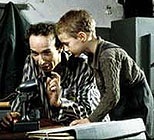|
|
|
|
Life
is Beautiful
|
 |
|
It is amazing what a filmmaker can get away with these days by declaring his or her movie to be a fairy tale. This is the opening gambit of Roberto Benigni's truly bizarre tragi-comedy Life is Beautiful – and, from that point, it seems that every assault on dramatic credibility, and every grotesque contortion of plot and character required for the sake of hyper-sentimentality, is permissible. It pains me to have to declare that Benigni – one of the world's most gifted comic actors, writers and directors – is the auteur of such a poor film. In truth, there is around a full hour of good, watchable material here – in its first, normal, low-key half. Life is Beautiful starts as a simple romance in which Guido (Benigni) woos Dora (Nicoletta Braschi) and begins a family with her. Benigni and Braschi are simply two of the most adorable people ever to grace a cinema screen (as they have previously proved in, for instance, The Little Devil [1988]). Benigni's supreme verbal and physical skills as a comedian return us in an instant to the lost era of Charles Chaplin. Indeed, if it could be said that anyone truly makes films 'the way they used to', Benigni fills that bill. Life is Beautiful, in its best and most modest moments, is full of joy and wonder, and a belief in the transformative power of wishes and dreams. Like the queer trailer for the movie, this review has so far neglected to let on what Benigni's fairy tale is all about – the Holocaust. In the first half, the story's social background is subtly and artfully sketched – the racial persecution of Jews and the growing tide of Fascism. Indeed, the finest coup of the film is its gag prologue – showing Guido mistaken for a Fascist leader by a revering crowd as he careers past in an out-of-control car. Once Life is Beautiful reaches the camps, however, it goes completely off the rails. Benigni's crime is not the will to mix low comedy with high seriousness – Chaplin, Leo McCarey and Ernst Lubitsch all tackled similar political horrors with daring and verve. But the essential plot device here – Guido trying to sustain for his cute, little son Giosue (Giorgio Cantarini) the fantasy that everything happening around them is a mere game – is ludicrous and unworkable. There is some craft in Life is Beautiful, and a dollop of poignancy. But once Benigni's frenzied mugging and riffing is relocated to such a sombre setting – and every other victim of the Holocaust is relegated to the role of an extra in the grossly sentimental tale of a single, broken family – then the comedy becomes increasingly miscalculated and tasteless. MORE Holocaust fiction: Schindler's List, Train of Life, The Truce © Adrian Martin December 1998 |
![]()